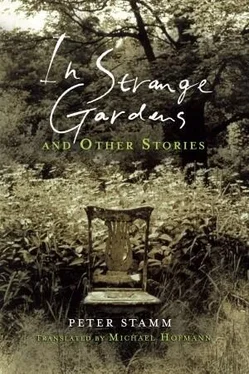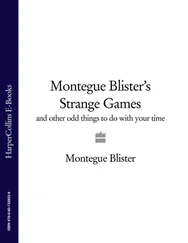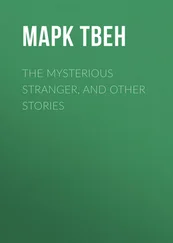“Thanks for the beer,” she said.
“Good luck,” I said.
For the next few days, I avoided the window. When I felt like a smoke, I went outside to Riverside Park. If it was raining, I sheltered at the tomb of General Grant. Sometimes I went as far as 100th Street, and spent a long time in front of the statue of the Buddhist monk. The bronze plaque on the statue said it was a depiction of Shinran Shonin, the founder of the sect of the true pure land. It came from Hiroshima, where it had survived the first atom bomb. That evening, I asked Eiko about the sect of the true pure land.
“Do you want to be a Buddhist?” she asked.
“No,” I said. “I don’t want to be reincarnated.”
Eiko said, according to Shinran’s precepts it was enough to say the name Amida Buddha to be admitted to the pure land.
“Do you think there is a pure land?” I asked.
“Switzerland,” said Eiko, and laughed. Then she shrugged her shoulders. “Life would be simpler if you could believe in such a thing.”
“I don’t know,” I said. And Eiko said: “More hopeful.”
My departure was now so close that it somehow paralyzed me. I had a few last days off, and toured the city with my camera, taking pictures of the places I wanted to remember, my neighborhood, my regular bar, the ferry to Staten Island, and the midtown area where I had worked. But it was as though the city was slipping away from me even while I clicked, as though it were stiffening, flattening, into a photograph, a memory, before my eyes.
All at once I had the feeling of being at home here. At first I couldn’t explain why, then I realized that, for the first time since I’d been in New York, I was hearing church bells.
On the day before my departure, it snowed. In the space of a few hours, a thick blanket of snow covered the city. The radio was full of news of closed subway lines, and jams on the main exit roads. There were reports of flooding in Monmouth and Far Rockaway. Chris, who had gone to a party with Eiko, called to say they would have to stay the night there, and so wouldn’t be able to say goodbye to me.
“I’ll visit you,” I said.
“Sure,” said Chris. “Good luck.”
I had packed my bags, and was watching TV to kill the time. Every station had reports on the flooding and the snow. Eventually I sat down in the window once more, and smoked. There was no light on in the dancer’s window, nor in Margarita’s either. Down on the street, some kids were playing in the snow. I watched them, and thought about my own childhood, and how we used to play in the snow. I felt happy to be going back to Switzerland.
Then one of the kids spotted me, and lobbed a snowball up in my direction. The others all looked up as well. They interrupted their game, and now all of them were throwing snowballs at me. It was too high up for them, but one of the snowballs hit just below me, and some of the snow splattered in my face. I shut the window, and took a step back into the shade. The children went back to whatever game they had been playing before. They seemed to have already forgotten all about me.
* National holiday in Switzerland.
I was amazed to see how small a heart was. It was lying in the patient’s opened chest, beating quickly and regularly. The ribs were pinned back by two metal clamps. The surgeon had had to cut through a thick layer of fat, and I was surprised that the wound wasn’t bleeding. The operation took two hours, and then the green cloths surrounding the patient were taken away. In front of us was an old man lying naked on the operating table. One of his legs had been amputated above the knee, and he had three large scars on his belly, from previous operations. His arms were spread wide, and tied down, as if he wanted to embrace someone. I turned away.
“Was it interesting for you?” asked the surgeon as we drank coffee together later.
“A heart’s such a small thing,” I said. “I think I’d rather not have seen that.”
“It’s small, but it’s tough,” he said. “Originally, I was going to go into psychiatry.”
I had come to the clinic to write up the case of a young woman patient. She had tuberculosis, and, in the course of her treatment at a different lung clinic, had contracted an incurable form of the illness.
At first, the patient had agreed to be interviewed, but when I came to the clinic she changed her mind. I waited two days, walked in the park, looked up at her window, and hoped she would agree to see me. On the second day, the consultant asked me whether I’d like to see an operation, to shorten my waiting time. On the morning of the third day, the tuberculosis specialist called me in the hotel, and said his patient would see me now.
The TB ward was in an old, separate building. There was no one to be seen on the large, glazed balconies. There were Christmas decorations up in the windows and the corridors inside. I read the information on the notice board, the business card of a hairdresser who did home visits, television rental offers. A nurse helped me into green scrubs that buttoned at the back, and handed me a mask.
“Larissa isn’t actually infectious,” she said, “as long as she doesn’t cough in your face. But it’s best to be safe.”
“I would like to talk to you as well,” I said, “if you have any time on any of the next few evenings …”
Larissa was sitting on her bed. I wanted to shake hands, hesitated, and ending up just saying hello. I sat down. Larissa was pale, and very thin. Her eyes were dark and she had unkempt thick dark hair. She was wearing a tracksuit and pink fluffy slippers.
We didn’t talk very long on our first meeting. Larissa said she was tired, and feeling unwell. When I told her about myself and the magazine I was working for, it seemed hardly to interest her. She no longer read much, she said. To begin with, she had, but not anymore. She showed me a doll without a face and just one arm.
“She’s for my daughter, a Christmas present. I wanted to give it to her on her birthday, but I couldn’t get it together. I feel like knitting, but instead I watch television, or the doctor comes, or it’s mealtime. And the evening comes, and I’ve gotten no further. And every day is like that, and every week, and every month.”
“She’s pretty,” I said.
The doll was ghastly. Larissa took it out of my hands, hugged it, and said: “I can only knit when I’ve got company. If I have company, then I can knit.”
Then she said she wanted to watch a film with Grace Kelly and Alec Guinness. She had seen it the day before, on a different channel. Grace Kelly played a princess who was in love with the Crown Prince. To make him jealous, she pretended to be in love with her tutor. And the tutor had been in love with her for a long time.
“The professor says to her, you’re like a mirage. He says you see a beautiful-looking picture in front of you and you rush toward it, but then it vanishes and you’ll never, ever see it again. And then she falls in love with him, and kisses him on the mouth. Just once. But the priest — he’s an uncle of hers — he says, if you think you’re happy, then your happiness is already over. And in the end she marries the Crown Prince. And the professor leaves. Because he says you’re like a swan. Always on the lake, majestic and cool. But you’ll never come ashore. Because if a swan comes ashore, it looks like a silly goose. To be a bird and never to fly, he says, to dream of a song but never be able to sing it.”
The clinic was some way out of the city, in the middle of the industrial park, right on the highway. I had taken a room in a hotel in the vicinity, an ugly new construction in rustic style. So far the only time I had seen the other occupants had been at breakfast time; most of them seemed to be sales reps. Later on, while I was reading the paper, a couple walked into the dining room. She was much younger than him, and he seemed so besotted with her I assumed he must be married, and she was his lover, or else a prostitute.
Читать дальше












